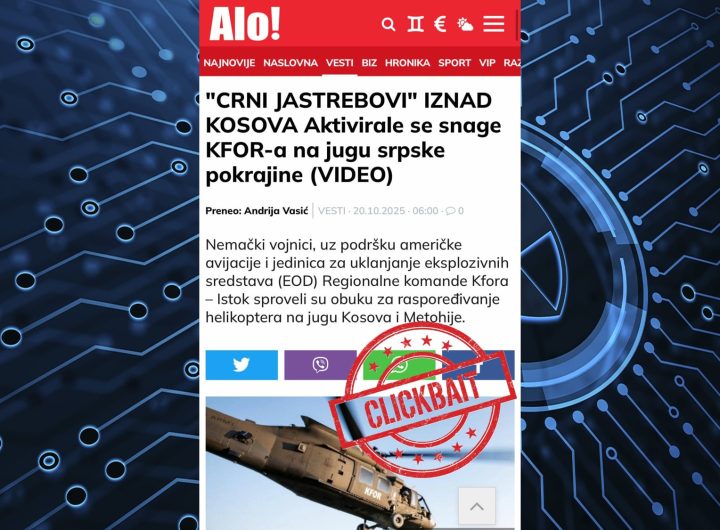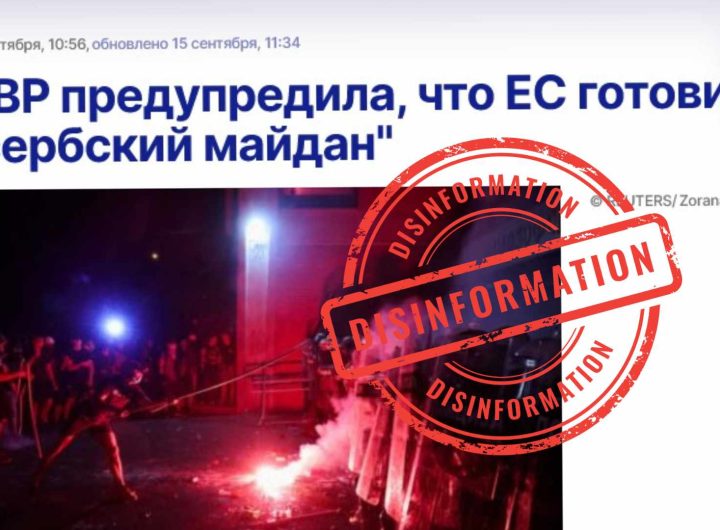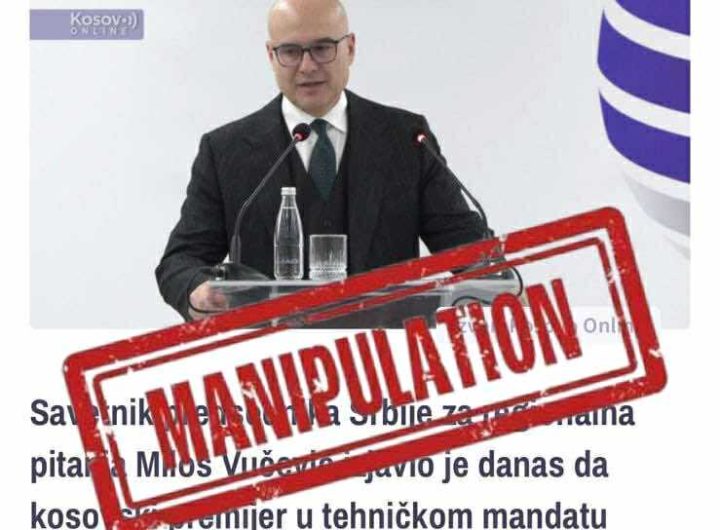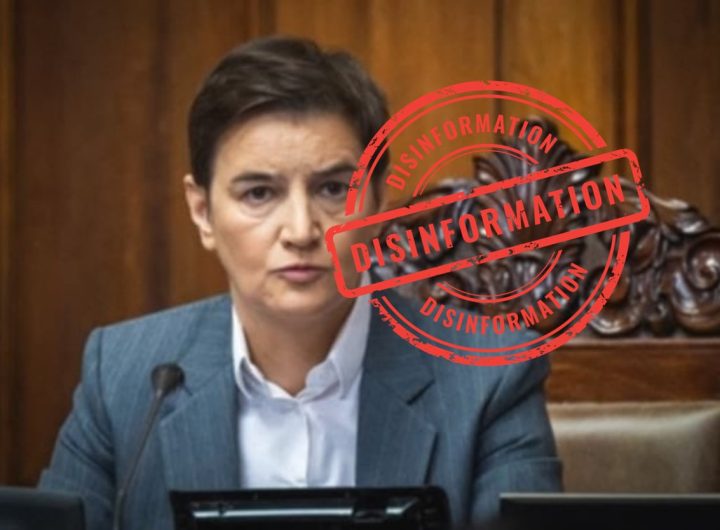
Media in Serbia have recently spread a wave of disinformation that distorts and misinterprets the statements of Kosovo’s Prime Minister, Albin Kurti, presenting every action of the state of Kosovo as a direct threat to Serbia. Through headlines such as “A general attack on Serbia is being prepared” and “Kurti warns of bloodshed,” these media outlets aim to create an atmosphere of fear and panic, spreading misinformation about Kosovo.
Moreover, the use of dramatic phrases such as “general attack” or “bloodshed” has no factual basis. They are designed to manipulate readers’ emotions and sow feelings of hatred and fear, creating a false narrative that escalates tensions. These media do not provide a full analysis of the facts or a clear context of Kosovo’s security policy, omitting information that would present these actions as necessary defensive and peacekeeping measures.
Below, The Geopost provides an overview of all this:
The acting Prime Minister of Kosovo, Albin Kurti, who yesterday was unanimously nominated by the General Council of the “Vetëvendosje” movement as the candidate to form the new government, in his extensive speech also spoke about security issues, stating that more than one billion euros will be allocated for the army during the next mandate, also announcing the development of “Made in Kosova” military drones.
Thus, the newspaper Kurir, with its headline and terms in the text such as “general attack” and “joint unit” – expressions that evoke images of military actions, attacks and escalation of conflict – gave the military cooperation of the two states (Kosovo and Albania) the highest dose of sensationalism and dramatization. In this way, attention is immediately drawn, but fear and panic are also spread.
The headline in Kurir (“A GENERAL ATTACK ON SERBIA IS BEING PREPARED! Kurti announced the creation of a joint unit of the so-called KSF and the Albanian army”) implies that Kurti (or Kosovo) is leading an aggressive campaign against Serbia. Instead of being objective, the headline builds a narrative of antagonism and hostility.

This is a polarizing headline that provides no information about the context of the actual statement – for example, whether Kurti actually mentioned the “joint unit”. This lack of additional information or quotations creates space for misinformation and misinterpretation of the event.
Such rhetoric manipulates people’s basic emotions – fear of war, national solidarity and territorial defense. Such an environment is often used to reinforce certain political or ideological positions among readers.
By using a headline that suggests Kurti is attacking Serbia, the reader is guided to see Kosovo as a threat, rather than as a subject with its own positions or demands. This reinforces the “us versus them” narrative and deepens polarization in the public sphere.
In the text of media such as Novosti (headline: “A GENERAL ATTACK ON SERBIA IS BEING PREPARED: Kurti confirmed he is preparing for bloodshed”), expressions like “general attack” and “bloodshed” are used – rhetoric that alarms the reader and provokes an emotional reaction without objective reporting. This sensationalism aims to stir the lowest emotions, such as fear and hatred.

The use of the term “bloodshed” serves not only to alarm but also to steer the reader toward a particular political narrative – portraying Kurti as an aggressor and a threat to stability, without support in concrete facts.
The headline and subheading offer no alternative, comment or background analysis that would enable a more informed perception of the situation – they are reduced to a propagandistic construction.
A message built in this way automatically places the reader in a defensive position: Kurti is presented as the current enemy, which strengthens division and increases social tensions.
The text in Politika highlights that Albin Kurti, acting prime minister, announced that over the next four years he will allocate more than one billion euros for “Kosovo’s armies” and the development of drones, including the formation of a joint unit with Albania.

The headline does not clarify that this is a legitimate defensive strategy and strengthening of security capacities, which has international support, nor that regional tensions are often fueled by Serbia as a reason for these measures.
For the domestic reader, especially in Serbia, the headline can cause a sense of immediate threat or aggression.
Focusing only on the military dimension leaves aside the broader context, such as cooperation with NATO partners, the United States, necessary operational measures or institutional development.
The headline in Politika creates a sensational atmosphere and clearly triggers an emotional reaction, without sufficiently contextualizing the facts. This increases polarization and tensions, especially in Serbia, where topics like Kosovo are often interpreted through the lens of threat and identity.
The text in Alo with a headline beginning with the exclamation “A GENERAL ATTACK ON SERBIA IS BEING PREPARED!” immediately throws the reader into an environment of fear and panic. Militaristic language is used to create the impression of an imminent danger, even without considering the facts that the text actually brings.

The phrase “he is thirsty for bloodshed” has no clear source basis – it seems to be the author’s own construction, not a direct quote. Instead of providing informative facts, the headline suggests intent and aggression.
In the text itself it is stated that Kurti plans major investments: one billion euros for security forces (KSF), drone development and the formation of joint units with Albania. Such measures may be part of a legitimate defensive strategy – but the headline presents them as a direct threat.
In the text of the portal B92 (“A general attack on Serbia is being prepared; Kurti announces the creation of a joint unit of the so-called KSF and the Albanian army”) it is stated that Albin Kurti, acting prime minister, declared that over the next four years more than one billion euros will be allocated for the so-called Kosovo Security Forces (KSF), as well as plans to launch the production of military drones and the formation of a joint unit with the Albanian Armed Forces.

The headline uses the phrase “A general attack on Serbia is being prepared,” which is emotionally charged and evokes aggression, even war. Such a style immediately grabs attention and provokes fear, regardless of the facts.
The headline creates the impression of a mobilization of military force directed against Serbia, while in the text it is about strengthening defensive capacities and domestic drone production. The clear context and purpose of the investment are not presented in an alarmist tone.
Also, the media Informer writes:
“Now everything is clear! Kurti is preparing for war, for a general attack on Serbia!”

The propaganda of Informer uses dramatic and frightening language to incite panic and tension in the public. The statement that “Kurti is preparing for war, for a general attack on Serbia” has no factual basis confirmed by independent international sources or reliable diplomatic institutions.
In reality, the government of Kosovo and international leaders have continuously emphasized the importance of dialogue and peaceful resolution of issues between Kosovo and Serbia. It has often been reported that military incidents or tensions involve exaggerated rhetoric from some media to generate clicks or influence public opinion, not political reality. /The Geopost/

 Regular KFOR exercise misinterpreted by serbian media
Regular KFOR exercise misinterpreted by serbian media  EU targeted by Russian intelligence services
EU targeted by Russian intelligence services  Vučević manipulates facts: Kurti is threatening with weapons and trying to ignite the region
Vučević manipulates facts: Kurti is threatening with weapons and trying to ignite the region  Brnabic disinforms: The canopy in Novi Sad collapsed as the start of a color revolution
Brnabic disinforms: The canopy in Novi Sad collapsed as the start of a color revolution  Petkovic disinforms about a property in the north, denied by the Property Verification Agency
Petkovic disinforms about a property in the north, denied by the Property Verification Agency  Lavrov’s disinformation: Moscow the “peacemaker”, the West the aggressor
Lavrov’s disinformation: Moscow the “peacemaker”, the West the aggressor